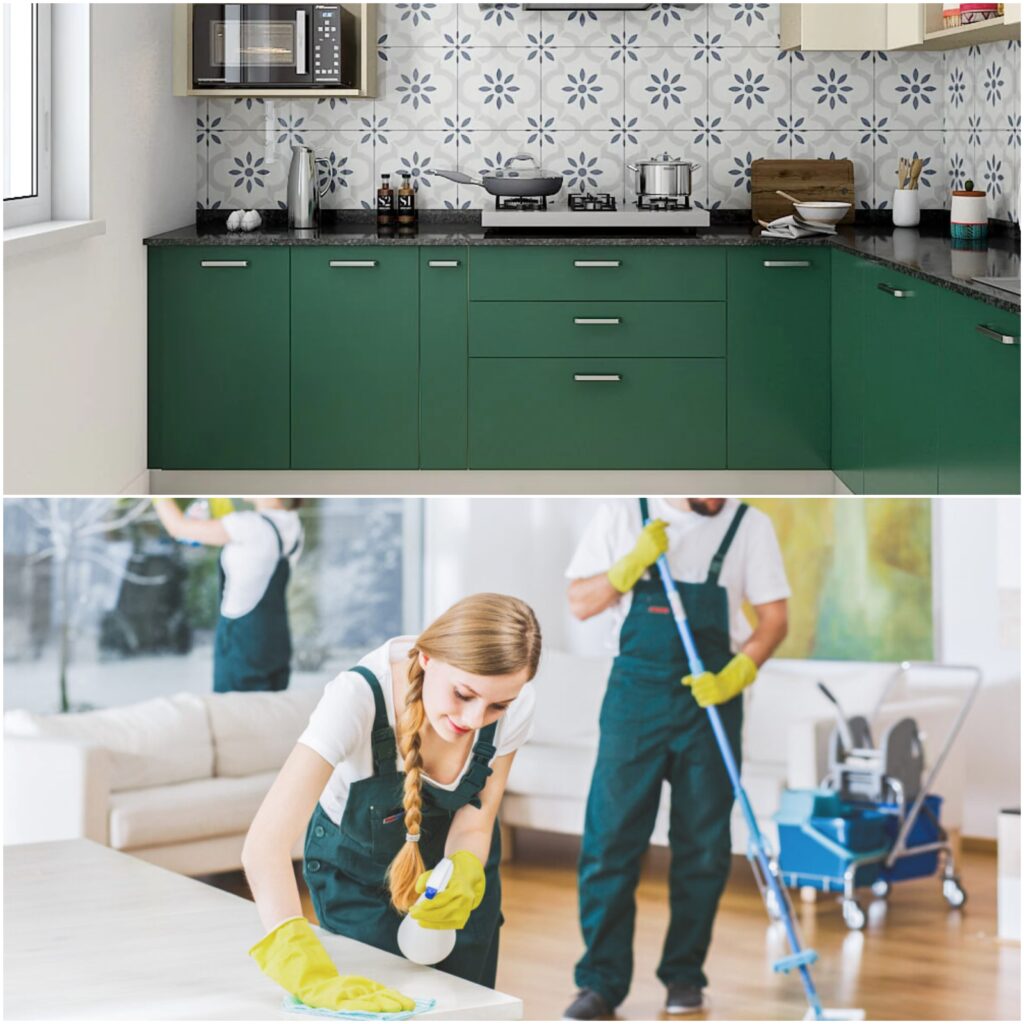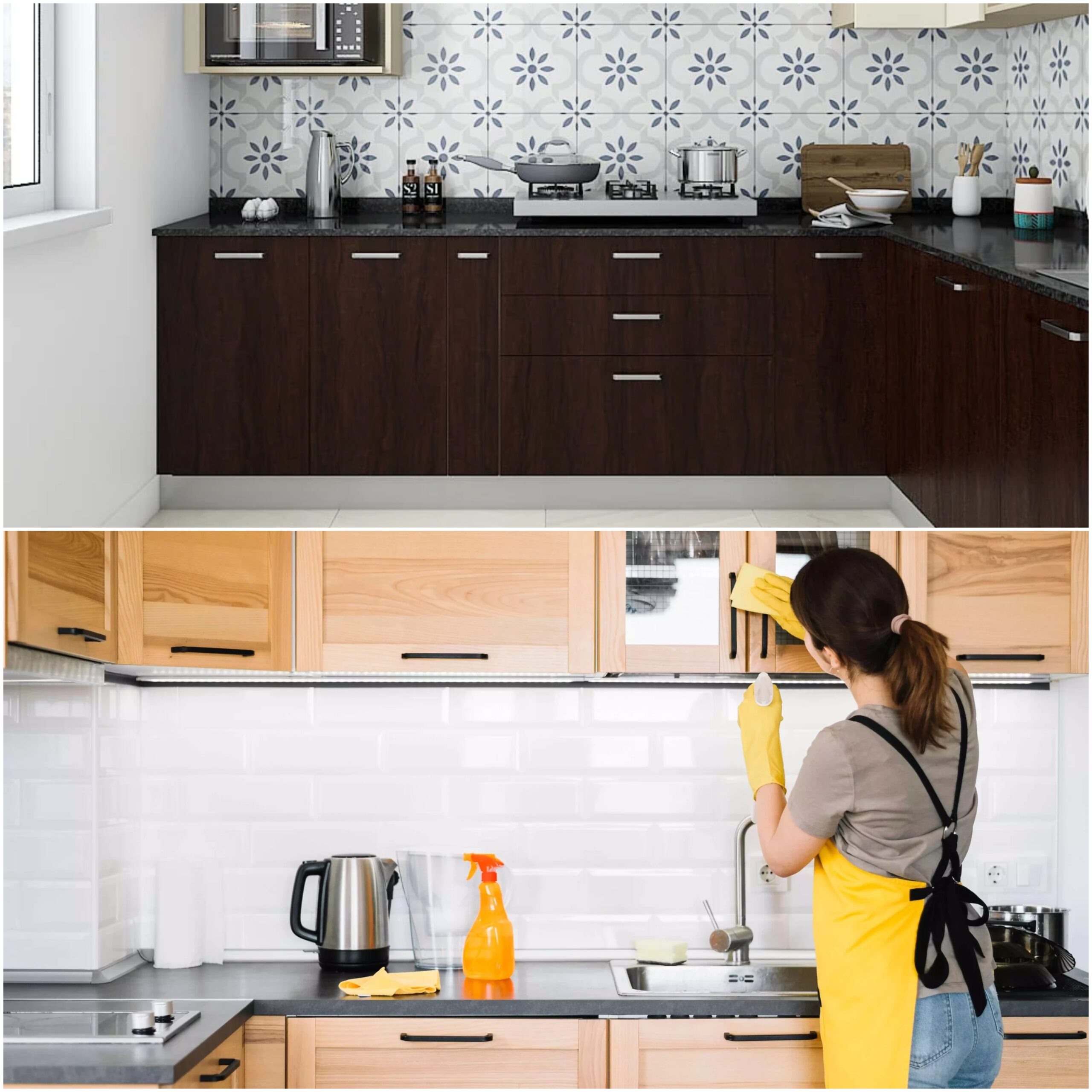The center of each home is a well-kept kitchen, particularly in the USA where family meals, socializing, and daily activities frequently take place in the home kitchen.
Maintaining your kitchen’s cleanliness, safety, and functionality for all of its uses goes beyond simply keeping it looking nice.
A clean home kitchen is important for the efficiency and comfort of your house, whether cooking or just spending time with loved ones.
Maintaining your home kitchen can raise the value of your house, which is quite beneficial if you ever want to sell. Maintaining the best possible condition for your kitchen is an investment in the future and use of your house.

How to Keep Your Home Kitchen in Top Shape?
A) Clean as You Go
Try cleaning surfaces and tools right away rather than allowing dirt and dishes build up. This easy practice keeps food and grease off cutting boards, stovetops, and surfaces.
You can keep a clean atmosphere, save time later, and avoid the stress of a large cleanup session after cooking by cleaning as you go.
Wash any prep utensils or knives, wipe down worktops, and scrub your stovetop to get rid of spills. This facilitates and expedites home kitchen cleanup.
B) Dish Duty
The secret to keeping home kitchen smoothly is to wash the dishes as soon as you finish eating. Plates with leftover food can easily become disorganized, making cleanup more difficult.
Wash dishes as soon as you can, or at the very least, rinse them to stop food from sticking, rather than letting them pile up.
If you are pressed for time, you may either load the dishes into the dishwasher or let them air dry on a drying rack.
This is ensuring that your home kitchen is prepared for the following meal and keeps your sink clear of clutter.
C) Trash Management
Maintaining a pest-free and odor-free home kitchen requires effective garbage management. Trash collections may attract undesirable insects and produce offensive scents.
Use odor-proof containers to prevent this, and separate recyclables to cut down on waste.
To ensure that your kitchen is clean at the beginning of each day, make it a practice to take out the garbage on a regular basis, ideally every night. This little effort keeps your home kitchen clutter-free and in peak condition.
Read: Maintaining Your Home Water Filtration System
Weekly Deep Cleaning Routine
A) Appliance Care
- Cleaning home kitchen equipment on a regular basis will help them function more effectively and last longer because they put in a lot of labor.
- Use a mild scrubber and a solution of baking soda and water to clean the stove of any food residue.
- Use a moist cloth to clean the interior of microwaves, and use a bowl of water and lemon to steam away food splatters.
- To get rid of buildup and smells in your dishwasher, clean the filter and run a cycle with a cup of vinegar. Lastly, you should clean your refrigerator as well.
- To maintain it functioning properly and avoid mold, take out any expired food, clean the shelves, and use warm soapy water to clean the door seals.
- You can make sure your appliances operate at their best and prevent future expensive repairs by keeping them clean.
B) Countertop and Sink Sanitization
- If you do not clean home kitchen sink and countertops on a regular basis, bacteria can grow.
- Countertop disinfection is necessary, particularly after handling raw meat or other potentially contaminated items.
- Wipe off every surface with a non-toxic, food-safe cleaner, paying special attention to places where spills and crumbs tend to hide.
- Scrub your sink with a solution of baking soda and water to sanitize it, paying particular attention to any stains or food residue.
- Then give it a good rinsing. To make sure there are no germs in your sink, you can also apply an all-purpose disinfectant.
- Maintaining a clean environment for meal preparation lowers the chance of contracting an infection caused by food.
C) Organizing Cabinets and Pantries
- You can find what you need more easily and avoid clutter by keeping your pantry and home kitchen cabinets organized.
- To make it easy to recognize the contents of jars and containers, start by labeling them.
- You may reduce waste and make sure you are using things before they expire by rotating the food in your cupboard and putting the older items in front.
- Go through your pantry sometimes to get rid of any unwanted or expired items.
- Use pull-out drawers for convenient access to items kept in the rear or stackable shelves to make the most of available space.
- In addition to saving time, a clean home kitchen guarantees that your food will remain fresher for longer.

Monthly Maintenance Checks
A) Inspecting Kitchen Plumbing
- Regular plumbing inspections of your home kitchen are necessary to avoiding problems like leaks or clogged drains, which can require costly repairs. Explore the area beneath the sink first for any obvious water stains or leaks.
- If you notice any, tighten the pipes or replace worn-out seals. Check the drainage by running hot water down the sink to ensure it flows smoothly without any blockages.
- Pour a vinegar and baking soda mixture down the drain once a month to keep it clear and avoid buildup.
- A little monthly plumbing check can save you from costly repairs and keep your kitchen running smoothly.
B) Checking for Pests
- A tidy kitchen can easily become a nightmare due to pests. Check your home kitchen frequently for indications of pests, like gnaw marks or droppings, to avoid infestations. Food should be kept off of countertops and in airtight containers.
- Look for any openings or holes where pests can enter, like those around doors, windows, or walls.
- Try keeping cinnamon sticks or bay leaves in your cupboard to naturally ward off bugs; these smells are known to keep insects away.
- By routinely wiping down surfaces and picking up crumbs, you may keep your kitchen free of unwelcome visitors by removing the food sources that attract pests.
C) Maintaining Ventilation
- Maintaining clean, grease- and moisture-free kitchen air requires proper ventilation. Range hoods’ performance may suffer as a result of dirt and grease buildup over time.
- Every month, remove the filters and give them a wash in warm, soapy water. Also, confirm that there is no accumulation of dust or grease obstructing the air vents.
- Make sure the exhaust fan in home kitchen is operating correctly to get rid of cooking and smoke smells.
- In addition to preventing mold and mildew, keeping your kitchen well-ventilated can help keep the area clean and healthy.
Read: Innovative Ways to Stay Cool in Your Outdoor Space during Summer

Seasonal Kitchen Maintenance
A) Spring Cleaning
The larger home kitchen cleaning chores that are neglected during daily or weekly routines are best tackled in the spring. Clean the area behind the refrigerator first.
Unplug the refrigerator, take it out, and vacuum the area since dust and food particles might gather there.
After that, give your cabinets a thorough cleaning by cleaning the interior and outside and organizing your belongings to clear clutter.
Defrost your freezer if there is ice accumulation to make sure it functions properly. Your kitchen will look better and be ready for the upcoming months with spring cleaning.
B) Winter Prep
Making ensuring your kitchen is ready for winter guarantees that it will be comfortable and functional during the colder months.
To keep the chilly air out, start by looking for drafts around windows and doors and sealing any openings.
To keep your kitchen warm, check that your heating elements are in good operating order. To avoid freezing and possible bursts, it is also critical to insulate pipes, particularly in cooler parts of your kitchen such beneath the sink.
During the winter, follow these easy actions to make your kitchen cozy and safe.
C) Summer Maintenance
Maintaining a cool kitchen is necessary for both comfort and productivity during the sweltering summer months.
To keep the entire house, including the kitchen, cool, start by making sure your air conditioner is maintained and operating correctly.
If there is no air conditioning in your kitchen, make sure your fans are doing a good job of moving air about.
Give your kitchen equipment a thorough inspection because summer may also be hard on them.
Prior to heavy use during holiday dinners, make sure your oven is operating properly, clean the refrigerator coils, and check the dishwasher for any blockages.
Smart Kitchen Maintenance with Technology
A) Kitchen Gadgets
Smart kitchen appliances can make kitchen maintenance easier than ever in the current digital era.
You can keep organized and cut down on food wastage by using gadgets like smart refrigerators that monitor inventory and expiration dates.
Smart ovens may be remotely set to be ready when you need them, while smart dishwashers can optimize cleaning cycles and water usage for efficiency.
By reducing kitchen upkeep, these devices not only improve the functionality of your kitchen but also make it more economical and environmentally friendly.
B) Apps for Organization and Cleaning
Technology also provides a variety of apps that are designed to maintain the best possible condition of your kitchen.
You can track your ingredients, cut down on pointless purchases, and arrange your grocery shopping with the help of meal planning apps.
To ensure that you never forget a cleaning duty, you can create cleaning schedules using apps like Google Keep or Todoist.
Apps that create shopping lists based on meal planning can help you minimize food waste and maintain a tidy kitchen.
You can maintain your kitchen operating efficiently with little effort by integrating these items into your daily routine for better organization and upkeep.

Bottom Line
Regular attention is necessary to keep the kitchen hygienic and functional. You may ensure that your kitchen remains in excellent condition throughout the year by following to a daily maintenance schedule, doing a weekly deep clean, and doing periodic inspections. Additionally, you may increase the efficiency of your kitchen maintenance by integrating smart technologies and organizing apps.
Read: The Latest Outdoor Lighting Trends to Illuminate Your Yard











